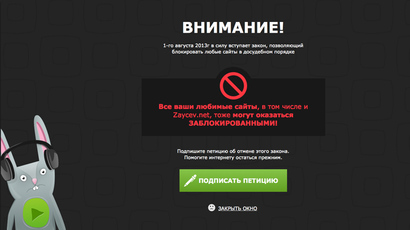Russian prosecutors may have right to block extremist websites without warrant

The State Duma has passed in a first reading a controversial bill that would enable the Prosecutor General’s Office to block extremist websites without a court ruling.
According to the bill, submitted to Russia’s lower house of parliament, a website could be blocked immediately after prosecutors report the content they deem illegal to the Federal Service for Supervision of Communications. The website would be blocked after the communications service notified the internet provider hosting it.
The provider would be given a day to inform the owner of the website about the blocking. Websites would be unblocked immediately after banned content is removed, according to the bill.
Currently, it takes several days to obtain a court decision to block an internet site.
A special agency might be set up within the Prosecutor General’s Office to surf the web in search of provocative messages.Opponents of the new legislation fear that it could be used for defacing websites, while the bill’s supporters argue prosecutors are clever enough to distinguish mass calls for unrest from other things.
The legislation in question is an amendment to the 2006 law “On information, information technologies and information protection,” and was proposed by MPs from three factions: the Liberal Democratic Party, the Communist Party, and the ruling United Russia party.
The bill’s authors believe immediate blocking of websites, either in Russia or abroad, would not be a problem for the prosecutors.
“It’s easiest to do on social networking websites, as companies owning them have the means and access to expensive technology to block particular pages,” Andrey Lugovoy, from the Liberal Democratic Party said, Interfax reported. “Twitter and Facebook are more problematic, because their headquarters are situated abroad, but it’s possible to do it quickly with them also.”
When presenting the bill to the Duma’s Information Committee, Lugovoy recalled how internet resources were used to quickly assemble protesters for a major anti-migrant rally in Moscow in Moscow in October. It was sparked by the alleged murder of a Muscovite by a citizen of Azerbaijan. Calls for rioting then appeared, even on the usually totally apolitical “Yandex. Probki” resource, featuring Moscow traffic jams online.
The legal issues commission of the Russian Association of Electronic Communications believes the bill is contrary to the Constitution, because it gives powers hitherto held by courts to prosecutors, a representative of the organization told Vedomosti.
Lawyers from the group also commented that there was no blacklist of information deemed blockable by prosecutors, leaving vague guidelines for blocking internet sites. There is also no specific way of handling media websites, where provocative statements are likely to appear in readers’ comments on articles.
Russia’s internet community has reacted strongly in the past when the government introduced anti-piracy legislation, imposing serious limitation on copyrighted material being shared on the web.
On August 1, 2013, over 1,700 websites in the Russian internet joined an online strike against the new anti-piracy legislation, which allowed pre-trial blocking of web pages.
Soon afterward, an online petition against the Russian anti-piracy law received the 100,000 signatures necessary to send the document for government discussion.
On Tuesday, the amendments to the law "On information, information technologies and information protection" have passed a first parliamentary reading.













